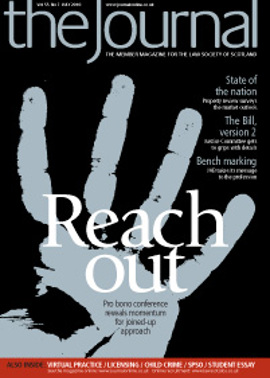Criminalising children

The Scottish age of criminal responsibility is amongst the lowest in the developed world. In practice, of course, the majority of children who commit criminal offences are not prosecuted in the criminal courts but are instead referred to the children's hearing: we believe (rightly) that a welfarist rather than a punitive response is the most appropriate way to address a child's offending behaviour.
The Criminal Justice and Licensing (Scotland) Bill 2010, which passed stage 2 in May 2010, will raise the age at which a child can be prosecuted to 12, but it retains the presumption that a child under the age of eight cannot commit a criminal offence.
So a child who commits an offence between the ages of 8 and 12 cannot be prosecuted, but might still be referred to a children's hearing. This sounds unobjectionable. However the children's hearing system is not purely welfarist and punitive consequences do follow, if a child is referred on the basis of having committed an offence.
Criminal records
The main punitive consequence is that the child acquires a criminal record: the Rehabilitation of Offenders Act 1974 and the Police Act 1997, which established Disclosure Scotland, apply. Section 3 of the 1974 Act provides that where a child has been referred to a hearing on the ground of having committed an offence, "the acceptance, or establishment (or deemed establishment), of that ground shall be treated for the purposes of this Act... as a conviction, and any disposal of the case thereafter by a children's hearing shall be treated for those purposes as a sentence".
Section 5 of the 1974 Act "rehabilitates" the child (that is to say treats the child as not having committed an offence) after one year from the "conviction", or at the end of the period of the "sentence", whichever is longer. The record is, for most purposes, expunged.
The problem lies in the exceptions to rehabilitation, for criminal records are not expunged for the purposes of disclosure certificates issued by Disclosure Scotland. Anyone applying for positions involving caring for, training, supervising or being in sole charge of persons under the age of 18, or vulnerable adults (for example a teacher, nursery worker or foster carer), is obliged to reveal, through an enhanced disclosure certificate, their "criminal" record - with details of all "convictions" including those "spent" under the 1974 Act. Depending upon the nature of the offence that brought the child to a children's hearing, this might reduce or remove entirely the person's chances of employment in any position involving children or vulnerable adults.
Options for change
The Children's Hearings (Scotland) Bill 2010, which completed its stage 1 consideration in June, currently makes no change to this position, though many consultees expressed disquiet. In giving evidence to the Education, Lifelong Learning and Culture Committee of the Parliament, the Minister for Children undertook to look at the matter again, to ensure that the criminal record consequences of appearing before the children's hearing were not applied disproportionately (see Official Report, 5 May 2010, col 3537).
What amendments might be made to the bill at stage 2 (which is due shortly)? Here are my own suggestions for the minister.
First, the age of criminal responsibility could be raised to the age of 16, avoiding the problem entirely. Given the Parliament's very recent consideration of the matter, this option is unlikely to find favour. In any event, it would prevent criminal record consequences even for those very few children who, by remaining a risk to others in adulthood, probably do require to be obliged to disclose their past behaviour.
Secondly, the age of criminal responsibility (as well as of prosecution) could be raised to 12. This would restore the natural link between responsibility and prosecution, without preventing badly behaved children under 12 being brought to a children's hearing (on grounds other than the commission of an offence). It would, however, still involve potential criminal record consequences for children 12 years of age or more, and so does not address the problem for the older child with whom it is, perhaps, more likely to be an issue.
Thirdly, given that the crux of the problem lies with the Rehabilitation of Offenders Act 1974, the simplest solution would be to repeal s 3 of that Act. Children could continue to be referred to the children's hearing on the basis of having committed a criminal offence, but the hearing's outcome and its consequences would be entirely welfarist and there would be no "criminal record" requiring to be disclosed. If the child's behaviour were so serious that lifelong criminal consequences were justified, that child could be prosecuted (if over 12) in the criminal courts. To avoid the risk that prosecutors would seek to prosecute more children than at present, the Lord Advocate's guidance on prosecution of children would need to focus on protection of others from a child who is likely to remain a risk as an adult.
Fourthly, we might remove the most pernicious feature of the current system - that the 1974 Act applies to grounds that are accepted, often without legal advice as to the consequences, as well as grounds established after evidence - and replace it with a rule that rehabilitation and disclosure apply only where the offence has been established, beyond reasonable doubt, in a court of law. Though superficially attractive, this may well be the least satisfactory of all the options, for it would create an unacceptable incentive to children to accept allegations against them by offering them the reward of avoiding any criminal record. This would be more pernicious than the current system, for in order to ensure that the child has complete freedom to decide whether to accept or to deny the grounds, the legal consequences must be the same in either case.
Fifthly, if we accept that some children are likely to remain a risk to others even when they become adults, our focus should be on identifying these children and limiting the criminal record consequences to them alone. Not only would an appropriate test need to be determined, but it would also require to be decided who should make the judgment that the child posed a risk.
If that judgment properly lies with the children's hearing, then an amendment to the Children's Hearings Bill could give them the power to declare, as a disposal, that the child should be subject to the terms of the 1974 Act. If the judgment is more appropriately left to the sheriff, an amendment could require all cases in which the child is referred to a hearing on the basis of having committed a criminal offence to be sent to the sheriff for proof, with the sheriff being given the power to make an order that the 1974 Act is to apply. (This would likely encourage reporters to avoid the offence ground where possible, so minimising the number of cases in which the issue would arise.)
In my view, however, the judgment best rests with the reporter. The offence ground should therefore be amended to read something like "the child has committed an offence and it is likely that the child will remain a risk to others in the future".
The reporter would then have to determine whether both the offence and the risk exist, and can be proved to exist if denied. If the offence exists but the risk does not, for example, in cases of an isolated assault in the school playground, shoplifting, or act of petty vandalism, or incidence of consensual, unpressured and non-exploitative sexual activity, the reporter could still refer the child to a hearing, but on the basis of one of the other grounds, such as being outwith the control of the relevant person, or behaving in a way that has serious adverse effects on the child or another person (grounds 65(2)(m) and (n) in the 2010 Bill). This is my preferred option.
Continuing threat?
It needs to be remembered that there are only very few children whose offences are such that they are likely to continue to pose a threat to others into adulthood. The requirements of disclosure are designed to warn of threats; yet our fear of badly behaved children has led the present system to assume that society needs protection from, and warning about, any child (over eight) who commits any offence for whatever reason and in whatever circumstance. Scotland would be better served by encouraging children to become full members of society, with uninhibited employment prospects, even when, as children, their behaviour had been reprehensible. The system could, if the proposal above were accepted, identify real risks much earlier. The passage of the Children's Hearings (Scotland) Bill gives us an ideal opportunity to do so and it is to be hoped that the opportunity is taken.
- Kenneth McK Norrie is a Professor of Law in the University of Strathclyde
In this issue
- Drop everything
- Free to give
- For the common good
- "Not for the likes of me"?
- RoS fees up for review
- Taking shape
- Criminalising children
- Split decision
- A picture's worth a thousand words
- "Duty to trade" revisited
- Law reform update
- From the Brussels office
- Join the cloud
- Combating claims in interesting times
- Ask Ash
- Party confidential
- What fresh hell is this?
- Links with the past
- Stranger than fiction
- Acts of kindness
- Scottish Solicitors' Discipline Tribunal
- Website review
- Book reviews
- Service driver
- Forecast: cloudy






